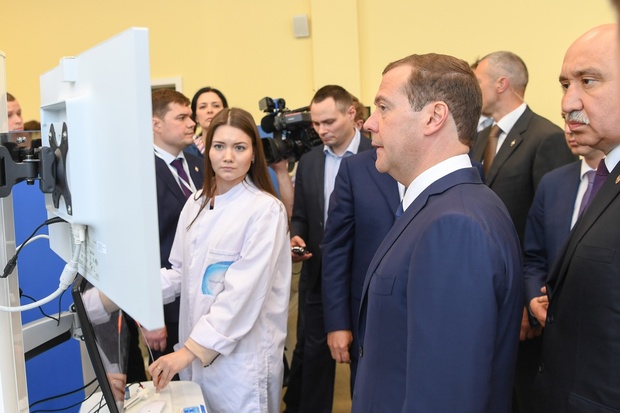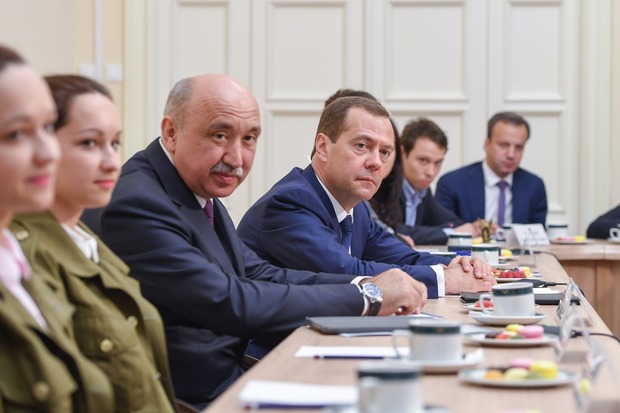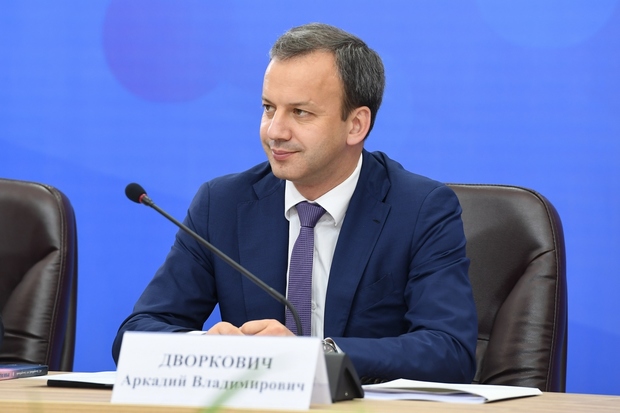Dmitry Medvedev: ''Have dear oil workers paid you money? Money hurts nobody''
The first day of Russian Prime Minister in Kazan: questions about salary, instant execution of orders and requests for foreign trips
Russian Prime Minister Dmitry Medvedev once again came to Kazan with a two-day visit. The first day was devoted to the development of student technological entrepreneurship. Prime Minister chaired the Council under RF President on economy modernization and innovative development and met with students and listened to suggestions on the subject. The event was held at the Institute of Fundamental Medicine of the Kazan Federal University. Before that, Medvedev had a tour of the building, they showed simulators, which future physicians use to practice surgeries. Later, at the Council meeting, Prime Minister called it a virtual hospital and said that it made a big impression on him. But to the students Medvedev said only that ''it was the right decision — to create a large classical university''. Read the details in the material of Realnoe Vremya.
''Have dear oil men paid you money?''
Medvedev began the communication with the students with a question: ''Do you like learning? Tell me what is your specialization?'' The students were confused by such an informal approach, they were obviously preparing for something more formal and decided not to improvise.
''First of all, I would like to thank you for the meeting,'' started Sergey Golovkin, a graduate of the Institute of Physics.
Golovkin said that he runs a small innovative enterprise, and also about a project that he implements for Tatneft. They talked a long time and, apparently, realizing that he still did not reach the main point, and he was running out of time, he admitted that ''a little went wrong here, as I was preparing...'' Medvedev reassured him: ''Life is different because something always goes wrong. You, as a student, as a practitioner, need to adapt,'' and suddenly asked, ''Have dear oil workers paid you money? It's a simple topic, but very important for any person, money hurts noone. How much do you earn?''
The pointblank question confused the student even more. Trying to avoid specifics, he said that in summer he gets more, in winter — less, but eventually he revealed: ''30-40 thousand''. And, like ashamed (if Prime Minister would think that it is not much), began to make excuses, like, I'm a student, so for us it is even much. But Medvedev was satisfied.

''Have they paid you for this work?'' again he asked the student. ''Our topic is student entrepreneurship, so it's not idle interest.''
''Yes, they have,'' quenched Medvedev's curiosity Sergey Golovkin. There were no more questions relating to salary.
Orders were given and immediately executed
After that, Golovkin got to the point — he told about the problems. According to him, small innovative enterprises have difficulty with renting space in universities. The process takes a very long time — they need to coordinate it with the Supervisory Board of the University, with the Ministry of Education and sometimes with the Federal Agency for State Property Management. Dmitry Medvedev immediately instructed to solve the issue.
Further, judging by how easily instructions were given and even instantly implemented, it became clear that students came to the agreed list of problems. For example, one of the participants of the meeting, stammering with excitement, talked about their ''difficulties and problems''. The girl and her colleagues are developing a system for monitoring the health of a driver, so that he was not asleep at the wheel. She complained that the project cannot be realized because there is no money. In order to find them (money or an investor who will give them), they need to present the development at industrial exhibitions abroad. But аor this there is also no money, and the university does not allocate them. Yes, confirmed Ilshat Gafurov, rector of Kazan Federal University: ''It is expensive and seen as an inefficient use of the resources.''
''We ask to allocate the money for the trips,'' concluded the student.

This request made Dmitry Medvedev smile.
''I'll tell you a secret — many good projects are not implemented due to a lack of funds. I understand that sometimes a student requires one — but it's still expensive. We need to think how to simplify the organization of such trips so that the management was not blamed of an inefficient expenditure of funds.''
Hardly had Dmitry Medvedev gave the instruction than Deputy Prime Minister Arkady Dvorkovich already implemented it.
'We offer a programme of support for technological entrepreneurship, a pilot project, we want to support several universities. In Kazan, Novosibirsk — large universities, and each will receive 30 million rubles, which they can spend on trips, or grant support,'' presented Dvorkovich the new project.
''Start choosing a business trip,'' said Medvedev to the girl.
''It hasn't given even a 10% return''
There came doubts about effectiveness of such assistance for the development of innovative entrepreneurship after Dmitry Medvedev announced that despite the large amount of state support for startups in form of grants and various subsidies (later at the Council on economic modernization and innovative development of Russia, he listed some of them: Megagrant program for the development of engineering centres, the Innovation Support Fund, aims to support innovators under 30 years) there is no a significant result.
''It hasn't given even a 10% return, which was expected. If to speak about start-ups and student entrepreneurship – it is no comparison to those results which are abroad. Unfortunately, the business do startups badly, everyone likes to invest in a win-win business, to have a return immediately,'' said Medvedev.
At the Council meeting, Dmitry Medvedev expressed another version of why our development is not working out.
''It is considered that our country is rich with inventors, but they poorly comercializare their inventions. It is more interesting for our scientists to develop creative ideas rather than to create a final marketable product. This is partly true. We have to teach this, if not from school then at university,'' said Prime Minister.

A meeting behind seven seals
The goal set by Prime Minister is clear — the results of intellectual work to turn into economically viable projects. This same aim was put to them in 2009, Medvedev recalled, when at universities it was allowed to create small enterprises for commercialization of scientific developments. Since 2009, about 3,000 such enterprises appeared, most of them were organized at universities. But, as Medvedev noted, there are no results that were expected.
After the meeting, to the media scrum there came out only Nikolay Nikiforov, Minister of Telecom and Mass Communications of Russia, who announced the decision on his profile: on the basis of the portal Gosuslugi to create a section that would collect all the grants and subsidies that may be acquired by a young entrepreneur because, as it turned out, there is another problem — support measures are many, but most of them are simply not known to people.